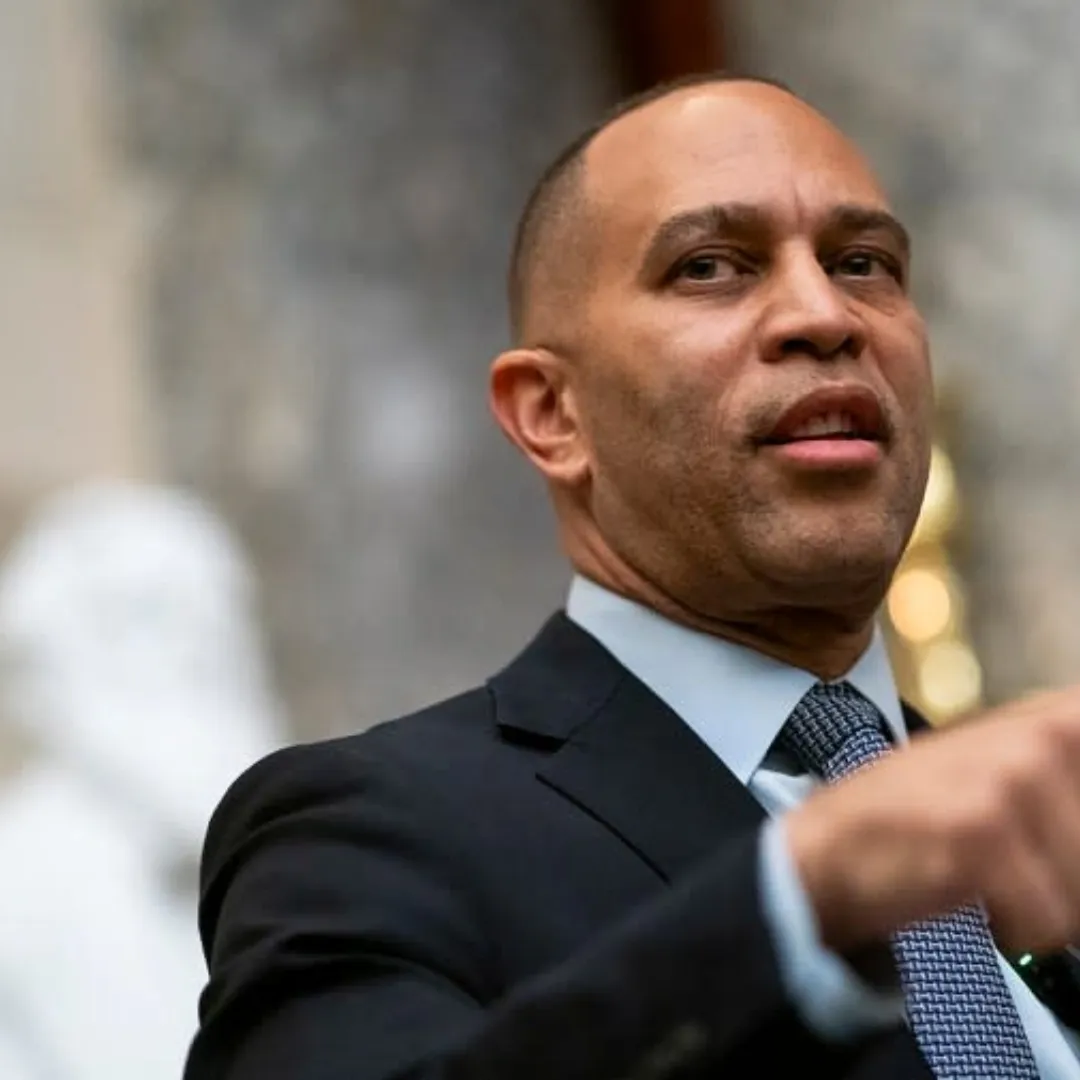
The scandal surrounding Secretary of Defense Pete Hegseth has captured the attention of the nation, igniting a political firestorm that stretches across party lines. It all began with a seemingly innocent communication—a group text in which top U.S. officials discussed military operations targeting Houthi rebels in Yemen.
But what was meant to be a secure conversation quickly turned into a national security crisis, with critical details about the timing of U.S. attacks shared over an unsecured messaging platform. The stakes were high, and the consequences—potentially deadly.
Yet, the response to this leak has not been one of accountability, but of deflection, denial, and increasingly bitter political divisions.
The controversy was set off by a release of text messages shared via the Signal app, a commercial platform that was supposed to provide secure communication. These texts were not just routine messages; they contained sensitive, classified information detailing the timing and sequencing of U.S. military strikes in Yemen against Houthi positions.
That information, if intercepted by enemies or released too early, could have jeopardized the safety of American personnel on the ground, turning what should have been a surprise attack into a predictable operation. And, as the story unfolded, it became clear that the person who shared those critical details was none other than Pete Hegseth.
Hegseth, who has long been an influential figure within the Trump administration, has found himself at the center of a storm of criticism. Rather than owning up to the gravity of the situation, Hegseth has remained steadfast in his denial of any wrongdoing.
He insisted, over and over again, that he had not shared classified information or military plans, despite the mounting evidence that he had, in fact, done just that. His refusal to take responsibility only fueled the outrage that followed, as political leaders, military experts, and the public demanded answers.
But it wasn’t just the Democratic Party that demanded accountability. The fallout from this leak has crossed party lines, with Republicans joining in the condemnation of Hegseth’s actions.
The leak, which exposed highly sensitive military information, was seen as a clear violation of national security protocols, and many, even from within Trump’s own party, now say it should not go unpunished.

The public backlash has been swift and fierce, especially from Democrats. Among the loudest voices calling for Hegseth’s resignation was Senator Tammy Duckworth (D-Ill.), a combat veteran, former Black Hawk helicopter pilot, and a respected member of the Senate Armed Services and Foreign Relations Committees.
Duckworth, whose own military service was marked by sacrifice—she lost both of her legs in combat during the Iraq War—spoke out strongly against Hegseth’s actions.
In a statement that left little room for ambiguity, Duckworth called Hegseth a “f‑‑‑ing liar” and demanded that he resign immediately. “Pete Hegseth is a f‑‑‑ing liar. This is so clearly classified info he recklessly leaked that could’ve gotten our pilots killed. He needs to resign in disgrace immediately,” Duckworth said.
Her anger was palpable, and her words reflected a deep concern for the safety of American service members—a concern shared by many across the nation.
But Duckworth did not stop at Hegseth’s resignation. She demanded that the entire incident be subject to an independent investigation. The leak, she argued, wasn’t just a mistake; it was a reckless breach of national security that endangered lives and could have put American military personnel in grave danger.
“Hegseth and every other official who was included in this group chat must be subject to an independent investigation,” Duckworth declared. “If Republicans won’t join us in holding the Trump Administration accountable, then they are complicit in this dangerous and likely criminal breach of our national security.”
This call for accountability resonated throughout Washington, as many questioned how such a breach could occur, especially within the highest levels of government. The leak was not a simple error; it was a catastrophic lapse in judgment, one that could have cost lives.
Duckworth’s statement was not just a condemnation of Hegseth’s actions but a call to action for those who had the power to hold officials accountable.

Hegseth, meanwhile, continued to aggressively deny that he had done anything wrong. Despite the mounting evidence, including the leaked text messages themselves, he rejected the notion that he had shared classified information.
He insisted, as he had before, that no war plans or sensitive materials had been transmitted through the unsecured Signal chat. His statements, however, were met with skepticism, as many pointed out that the information he had shared was, by all accounts, deeply classified.
“Nobody’s texting war plans,” Hegseth said while speaking to reporters before leaving Hawaii, attempting to downplay the significance of the leak. “You know who sees war plans? I see them. Every. Single. Day,” he added, trying to create a sense of normalcy around the situation. But this defense did little to calm the rising storm of criticism.
Hegseth’s response was seen by many as dismissive and deflective—an attempt to minimize the gravity of the situation. The texts that were leaked were far from innocuous.
They included the exact times of U.S. airstrikes, the flight paths of fighter jets, and other tactical details that, in the wrong hands, could have had deadly consequences. The fact that such information was shared over a commercial app, without the proper security protocols in place, was, to many, a sign of gross negligence.
Yet, despite the undeniable facts, Hegseth continued to insist that the information shared in the chat was not classified. This stance was echoed by others in the Trump administration, including national security adviser Mike Waltz, who took responsibility for adding The Atlantic Editor-in-Chief Jeffrey Goldberg to the group chat.
Waltz’s admission, while an attempt to deflect blame from Hegseth, did little to alleviate the concerns surrounding the breach.

The call for an independent investigation was not limited to Duckworth and other Democrats. Some Republicans, too, expressed their concerns about the leak and the potential national security ramifications. Representative Don Bacon (R-Neb.) was one of the first Republicans to publicly criticize the White House’s response, accusing them of “denial” over the leak and insisting that the information shared was clearly classified.
Senator Roger Wicker (R-Miss.), the chair of the Senate Armed Services Committee, also voiced his disapproval, stating that an investigation was needed to understand the full extent of the breach.
Wicker’s comments signaled a shift within the Republican Party. While many Republicans had been reluctant to criticize the Trump administration over its handling of national security issues, the Hegseth leak had forced even some of the most loyal Trump allies to acknowledge that something had gone terribly wrong.
The leak was not just a political issue—it was a matter of national security, and it was clear that an investigation was necessary to understand how such sensitive information had been mishandled.
The Hegseth scandal goes beyond the individual actions of one official; it is a stark reminder of the dangers of mishandling sensitive information, particularly in the context of ongoing military operations. The information shared in the Signal chat was not just trivial details—it was information that, if exposed, could have put the lives of American service members at risk.
National security experts have pointed out that this breach could have had catastrophic consequences. If the Houthi rebels had received the information about the timing of the U.S. airstrikes, they could have taken steps to mitigate the damage or even prepare for the attack.
The very nature of military operations is to keep the element of surprise, and the leak undermined that principle.
As the investigation continues, it is clear that the fallout from this scandal will not be easily contained. The pressure on Hegseth to resign is mounting, and the political ramifications of this leak will likely ripple through Washington for months to come.
What started as a simple leak of information has now turned into a full-blown political crisis, one that demands accountability at the highest levels of government.

The case of Pete Hegseth serves as a cautionary tale about the consequences of negligence at the highest levels of government. The leaking of sensitive military information is not just a mistake—it is a breach of trust that puts lives at risk and undermines the very security that government officials are sworn to protect.
The growing calls for Hegseth’s resignation and the demand for a full investigation are a reflection of the gravity of the situation.
This is not just a story about a leak—it is about the responsibility of those who hold the power to safeguard the nation’s security. The American people, and especially those who serve in uniform, deserve better than the recklessness displayed by Hegseth and others involved in this debacle.
The reckoning has only just begun, and the consequences of this scandal will continue to reverberate for some time.



